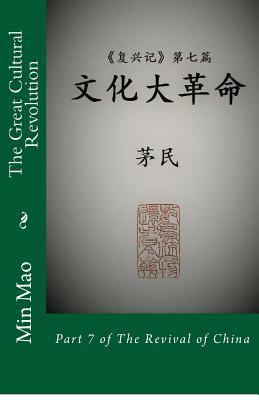Read The Great Cultural Revolution: (chinese Edition) Part 7 of the Revival of China - Min MAO | ePub
Related searches:
The Cultural Revolution: all you need to know about China's political
The Great Cultural Revolution: (chinese Edition) Part 7 of the Revival of China
China's Cultural Revolution, Explained - The New York Times
China’s Cultural Revolution: The World Turned Upside Down
The Chinese Cultural Revolution Revisited - JSTOR
China: The Cultural Revolution in Structural Perspective - JSTOR
The Cultural Revolution as a Crisis of Representation The China
The Great Proletarian Cultural Revolution - BANNEDTHOUGHT.NET
1 The Chinese Cultural Revolution: A - Cal Poly Pomona
How the Cultural Revolution changed China forever - CNN
Uncovering the Cultural Revolution's Awful Truths - The Atlantic
The Cultural Revolution begins - Alpha History
China’s Cultural Revolution, Explained - The New York Times
China: the Cultural Revolution Mass Atrocity Endings
About the Chinese Cultural Revolution - Dangerous Intersection
The Woke Mob: Echoes of the Chinese Cultural Revolution
The Great Chinese Famine - Chinese Revolution
The cultural revolution (in full, the great proletarian cultural revolution) took place from 1966 to 1976 in china. The benign-sounding moniker belies the destruction it unleashed upon the country’s population.
For millions of ordinary chinese, the cultural revolution was a period of restricted freedom, intimidation, social upheaval and economic disruption. The context for the cultural revolution was mao zedong’s loss of political power and prestige, following the disastrous failures of the great leap forward.
During 1967, two major schools of interpretation emerged among china watchers with reference to the great proletarian cultural.
Net - china - the great proletarian cultural revolution in china - documents from that period.
The cultural revolution was the upheaval launched by mao zedong during his last decade in power (1966–76).
Between 1966 and 1976, the young people of china rose up in an effort to purge the nation of the four olds: old customs, old culture, old habits, and old ideas. Mao sparks the cultural revolution in august 1966, mao zedong called for the start of a cultural revolution at the plenum of the communist central committee.
Launched by mao zedong, chairman of the communist party of china (cpc), its stated goal was to preserve.
Apr 3, 2020 in 1966, china's communist leader mao zedong launched what became known as the cultural revolution in order to reassert his authority.
The cultural revolution in china is formally referred to as the great proletarian cultural revolution. Mao zedong who was then the chairman of the communist party of china set the movement into motion. The primary goal was to preserve the true communist ideology by clearing the remnants of capitalists from the chinese society.
Mao zedong launched the great proletarian cultural revolution in 1966, and it lasted until his death in 1976. It paralyzed china for a decade and caused the death and dislocation of tens of millions.
Sep 9, 2016 the cultural revolution was a sociopolitical movement in china that began in 1966 with mao zedong, the leader of the chinese communist.
The revolution spins out of control� by february of 1967, china had descended into chaos. The purges had reached the level of army generals who dared to speak out against the excesses of the cultural revolution, and red guards were turning against one another and fighting in the streets.
73 million innocent human beings and spanned from may 16, 1966 until mao zedong’s death on september 9, 1976. Mao “unleashed the [cultural revolution] movement by urging young people to rise up against their parents and teachers”.
Liu shaoqi, china’s president, relaxed collectivization to undo some of the damage of the great leap forward and became the leading target of cultural revolution attacks.
The cultural revolution (1966-76) was a political movement launched and led by mao zedong in china from may 1966 until october 1976.
May 16, 2016 it's been 50 years since the start of china's cultural revolution, which consumed china in bloodshed, torture and chaos for almost a decade.
The cultural revolution, formally the great proletarian cultural revolution, was a violent sociopolitical purge movement in china from 1966 until 1976.
The end of the chinese cultural revolution is marked by the 1969 chinese communist party (ccp) congress which followed much of the random urban violence; the death of lin biao (earlier, the head of the pla) in september 1971; and the death of mao tse-tung (chairman of the chinese communist party) in 1976.
Cultural revolution, in full great proletarian cultural revolution, chinese (pinyin) wuchanjieji wenhua dageming or (wade-giles romanization) wu-ch’an chieh-chi wen-hua ta ke-ming, upheaval launched by chinese communist party chairman mao zedong during his last decade in power (1966–76) to renew the spirit of the chinese revolution.
Although the cultural revolution is frequently portrayed as originating in an elite power struggle within the chinese communist party (ccp), its earliest salvos.
The life of mao zedong the chinese communist leader responsible for the disastrous policies including the 'great leap forward' and the 'cultural revolution'.
Revolution that would have devastating and far-reaching impact on modern china.
The great famine or great chinese famine was a period of low agricultural production, food shortages and mass starvation in china, from 1959 to 1961. The ccp government attributes the famine to natural disasters such as droughts, floods, typhoons and pests.
May 10, 2016 the great proletarian cultural revolution was a decade-long period of political and social chaos caused by mao zedong's bid to use the chinese.
Cultural revolution and the transformation of china's political economy in the present portrayed as the only way of leading the nation to prosperity and to great.
May 14, 2016 what was the cultural revolution? the movement was fundamentally about elite politics, as mao tried to reassert control by setting radical youths.

Post Your Comments: